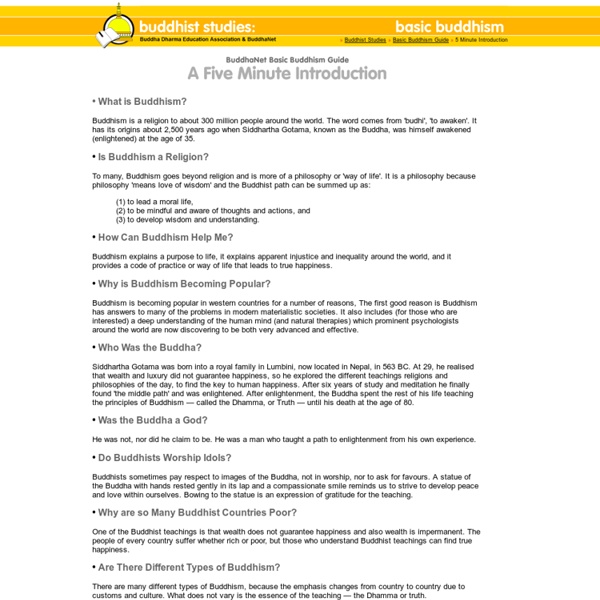Lecture Notes: Early Indian and Chinese Civilizations
The Rise and Spread of Civilization in India and China, c. 2500 BC-AD 535 Introduction and Overview: Early Indian Civilization 1) The third of the great river valley civilizations developed along the Indus River in present-day Pakistan. It flourished from about 2400 BC to about 1500 BC. 2) Shortly before its collapse, Indo-European or Aryan invaders entered the Indian sub-continent. 3) Over the course of the following centuries, these two civilizations blended and evolved, forming Indian civilization. 4) During this period, two great religious traditions — Hinduism and Buddhism — had their origins and then spread outwards. 5) Rise of Maurya and Gupta Empires. 6) Establishment of fundamental patterns of Indian civilization. Indus Valley Civilization
Basics of Buddhism
The Four Noble Truths The Four Noble Truths comprise the essence of Buddha's teachings, though they leave much left unexplained. They are the truth of suffering, the truth of the cause of suffering, the truth of the end of suffering, and the truth of the path that leads to the end of suffering.
Judaism
Judaism (from the Latin Iudaismus, derived from the Greek Ἰουδαϊσμός, and ultimately from the Hebrew יהודה, Yehudah, "Judah";[1][2] in Hebrew: יהדות, Yahadut, the distinctive characteristics of the Judean ethnos)[3] is the religion, philosophy and way of life of the Jewish people.[4] Judaism is a monotheistic religion, with the Torah as its foundational text (part of the larger text known as the Tanakh or Hebrew Bible), and supplemental oral tradition represented by later texts such as the Mishnah and the Talmud. Judaism is considered by religious Jews to be the expression of the covenantal relationship God established with the Children of Israel.[5] Judaism includes a wide corpus of texts, practices, theological positions, and forms of organization. Judaism claims a historical continuity spanning more than 3,000 years. Defining character and principles of faith Defining character
The Middle Ages
Characteristics of the Feudal World Timeline The Middle Ages or medieval time is believed to have started with the fall of the Roman Empire in 476 and to have lasted about 1,000 years until about 1450. The beginning of the Middle Ages is called the Dark Ages because the great civilizations of Rome and Greece had been conquered. The end of the Middle Ages in about 1450 led to the beginning of the Renaissance. The principal features of the Renaissance were that learning became important, the lords and the church were both becoming powerful forces for change, the art world was flourishing with innovations like the development of perspective in painting and there was great advancement in science. The barbarians were prevalent in most of the European nations of the Middle Ages.
The religion of Buddhism
Religions of the world Menu Quotation by Siddhãrtha Gautama (Buddha): "Do not believe in anything simply because you have heard it. Do not believe in anything simply because it is spoken and rumored by many.
Islam
Islam (/ˈɪslɑːm/;[note 1] Arabic: الإسلام, al-ʾIslām IPA: [ælʔɪsˈlæːm] ( )[note 2]) is a monotheistic and Abrahamic religion articulated by the Qur'an, an Islamic holy book considered by its adherents to be the verbatim word of God (Allāh), and for the vast majority of adherents, also by the teachings and normative example (called the Sunnah and composed of hadith) of Muhammad (c. 570–8 June 632 CE), considered by most of them to be the last prophet of God. An adherent of Islam is called a Muslim. Most Muslims are of two denominations: Sunni (75–90%)[8] or Shia (10–20%).[9] About 13% of Muslims live in Indonesia,[10] the largest Muslim-majority country, 25% in South Asia,[10] 20% in the Middle East,[11] and 15% in Sub-Saharan Africa.[12] Sizable minorities are also found in Europe, China, Russia, and the Americas. Converts and immigrant communities are found in almost every part of the world (see Islam by country).
History 266: World History from the Renaissance to Imperialism
Lecture Notes Developed by Lee M. Pappas and Nicholas C.
Sacred Texts: Buddhism
Sacred-texts home Journal Articles: Buddhism OCRT: Buddhism Buy CD-ROM Buy Books about Buddhism Modern works Southern Buddhism Northern Buddhism JatakaLinks Modern works
Christianity
Christianity is an Abrahamic religion that began as a Jewish sect in the mid-1st century.[9][10] Originating in the Levant region of the Middle East, it quickly spread to Syria, Mesopotamia, Asia Minor and Egypt. It grew in size and influence over a few centuries, and by the end of the 4th century had become the official state church of the Roman Empire, replacing other forms of religion practiced under Roman rule.[11] During the Middle Ages, most of the remainder of Europe was Christianized, and adherents were gained in the Middle East, North Africa, Ethiopia and parts of India.[12][13] Following the Age of Discovery, Christianity spread to the Americas, Australasia, sub-Saharan Africa, and the rest of the world through missionary work and colonization.[14][15][16] Christianity has played a prominent role in the shaping of Western civilization.[17][18][19][20][21] Beliefs



